Liber AL vel Legis III:59 exhorts, “As brothers fight ye!” Aleister Crowley’s own commentary (one he would eventually discard, however) on this verse paints a vivid picture of what such fraternal fighting should look like.
Crowley urges us to “Fight! Fight like gentlemen, without malice, because fighting is the best game in the world, and love the second best!”. In other words, conflict among “brothers” (spiritual or philosophical peers) ought to be sporting and honourable. One should avoid underhanded tactics: “Don’t slander your enemy, as the newspapers would have you do; just kill him, and then bury him with honour”. The tone here is provocative and metaphorical: by “kill” Crowley means to utterly defeat your opponent’s argument or position, but do so with respect and dignity. He continues: “Don’t keep crying ‘Foul’ like a fifth-rate pugilist. Don’t boast! Don’t squeal! If you’re down, get up and hit him again! Fights of that sort make fast friends.” This is quintessential Crowley: glorifying vigorous struggle as a form of game or sport that ultimately builds camaraderie rather than lasting enmity.
Such advice resonates with anyone who has ever had a friendly rivalry or a heated debate with close colleagues. True brothers can clash mightily and still remain brothers, perhaps even growing closer through the struggle.
The “love” in Thelema is often “bold, virile, even orgiastic,” as Crowley noted elsewhere, and not at all sentimental or meek. Likewise, there’s no room for cruelty or malice in a brotherly fight, as it’s about testing strength, exchanging blows of will or wit, and then respecting one another when the dust settles.
Crowley’s first interpretation of “As brothers fight ye!” emphasises personal honour, fairness, and resilience in conflict. It suggests that within the Thelemic community, disagreement and debate can be healthy – even “the best game in the world” – so long as it’s conducted face-to-face, fairly, and without invoking grievance or victimhood. Fighting, in this gentlemanly sense, means speaking your mind and standing your ground, but not nursing grudges. In an ideal Thelemic culture, after the sparring, we would “bury” the feud honourably and perhaps share a drink as friends who challenged each other.
The “Magical” Second Meaning: The Inner Duel
After extolling the virtues of fair fighting, Crowley hints at another layer of meaning to “As brothers fight ye!” – one far more esoteric and profound. “There is perhaps a magical second-meaning in this verse,” he writes, referencing ancient mythic duels: “the Ritual of which we find hints in the legend of Cain and Abel, Esau and Jacob, Set and Osiris, et cetera.” Rather than an external fight between comrades, this second meaning points to an internal struggle within each of us. Crowley explains: “The ‘Elder Brother’ within us, the Silent Self, must slay the younger brother, the conscious self, and he must be raised again incorruptible.” Here he invokes the archetype of one divine sibling slaying another – a theme seen in many mythologies – as a metaphor for the spiritual initiation process.
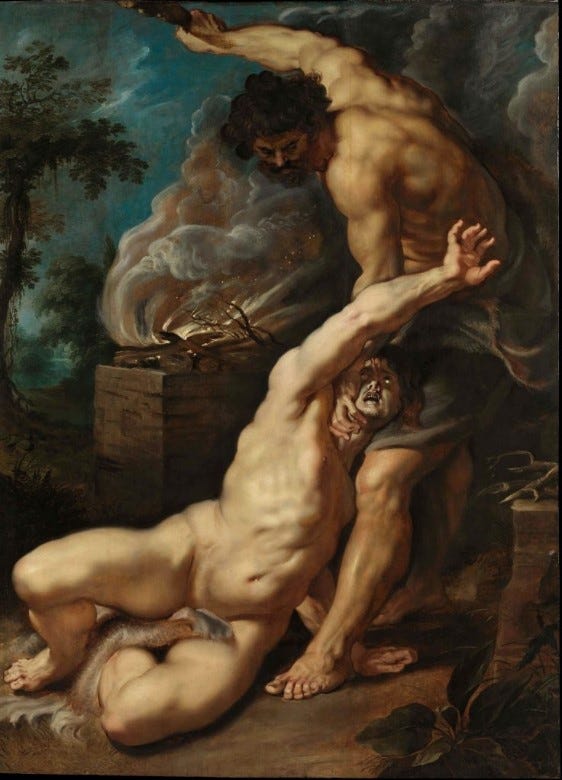
What does this mean in practical terms? The “Silent Self” or “Elder Brother” represents that spark of divine genius or True Will which Thelemites seek to cultivate. The “younger brother,” the conscious self, is our mundane ego, personal identity, and attachment to the material world.
Crowley’s magical meaning of the verse suggests that we must allow the Silent Self to overcome the ego, a process akin to the symbolic dying and rising found in initiation rituals. Just as Cain slays Abel or Osiris is dismembered by Set and then resurrected, our lower self must be sacrificed and reborn in a more enlightened form. This inner fight is essentially the Great Work of spiritual alchemy: the volatile elements of the personality (pride, fear, ignorance) are “killed” or dissolved, so that they can recombine in a purified, incorruptible state. The alchemical Solve et Coagula.
Crowley’s second interpretation elevates “As brothers fight ye!” from advice about interpersonal conduct to a profound instruction for self-transformation. It implies that inner conflict and self-conquest are necessary parts of the Thelemic path. One might think of the Holy Guardian Angel (that Silent Self and divine guide) subduing the lower ego, which gives way to the process of “Crossing the Abyss” where the ego is annihilated and the true adept is born.
In this view, the verse isn’t telling Thelemites to bicker with each other at all; it’s telling them to wage war within their own souls, to let the part of themselves aligned with the divine Will defeat the petty tyrant of the ego. This is a fight to the death (of the ego) that every aspirant must undergo.
And notably, it is a fight “as brothers” because both combatants are aspects of oneself, related like brothers, even as one must overcome the other. The outcome of this internal duel is unity: the resurrected Self that has integrated and transcended the lower parts of the psyche.
From Fraternity to Feud: The Misuse of “Fight Ye” in Cults
It seems absolutely obvious to me that Crowley’s “magical second-meaning” is far more worthy of examination than any literal call for Thelemites to tussle with each other. Unfortunately, history has shown that the literal interpretation – emphasising constant conflict among “brothers” – has been seized upon by some organisations in ways that pervert Crowley’s intent. Nowhere is this more evident than in the modern Ordo Templi Orientis, which, in my view, has devolved into a hierarchical cult where the rhetoric of “brotherhood” and “fighting” has been used to destroy dissenting opinions and foster abuse.
Let’s be frank: the O.T.O. leadership has long encouraged an environment of infighting, character assassination, and authoritarian suppression of criticism. Rather than “fighting like gentlemen” and becoming “fast friends” afterwards, the Order’s culture has often produced the opposite – factionalism, bitter grudges, and a trail of disillusioned ex-members. As someone who was deeply involved with the O.T.O. and departed in 2018 after seeing its inner workings, I have written extensively about these failures:
THE SINKING TEMPLE
I’ve been wildly vocal about my criticism of Ordo Templi Orientis (O.T.O.) leadership since I resigned in 2018.
WHEN IT’S TIME TO LEAVE YOUR MAGICAL ORDER
Since I first published the article about leaving behind Ordo Templi Orientis, I have received dozens of messages and emails, all asking a version of the same question. This one:
YOU GET OUT WHAT YOU PUT IN
The promise that effort yields reward lies at the heart of many spiritual and magical orders. “You get out what you put in” is an alluring maxim, speaking to the hope that sincerity, perseverance, and dedication will bear fruit.
In summary, the literal, surface-level reading of Liber AL III:59 – that Thelemites should fight each other like siblings – has been over-emphasised and grotesquely misapplied in organisations like O.T.O. Rather than fostering strength or growth, it has provided a handy excuse for toxic behaviour.
Self-appointed “kings” of these orders have effectively told members that in-fighting is some kind of Thelemic virtue, that to be constantly at war with one another (and to ruthlessly crush “heretical” opinions) is following the Book of the Law. In reality, this is a perversion of Liber AL. Crowley never intended for Thelemites to become schoolyard bullies hiding behind the word Brother. The true Thelemic fight was always meant to be the fight for freedom, light, and truth, whether that means duelling ideas in a collegial spirit or, most importantly, waging the inner war to conquer one’s lower self.
Rethinking Brotherhood and Conflict in Thelema
It is high time that Thelemites – especially those still involved in groups like O.T.O. – reconsider the facile habit of calling just about everyone “Brother.” This word is sacred. The Brotherhood of the Soul is rare and must be earned through genuine trust, respect, and shared experiences over time.
You do not automatically become my Brother or Sister because you joined the same club, took the same oath, or mouth the same scriptures. Fraternity is proven in the crucible of life through loyalty, honesty, and mutual support when it counts.
If an organisation hands out the title “Brother” as liberally as participation trophies, do not be surprised when it carries no weight and no genuine affection. In a healthy Thelemic community, two people might indeed “fight like brothers” – challenging each other’s ideas fiercely – yet still embrace afterwards in true love. But in a dysfunctional, cultish setting, “Brother” becomes a cynical tool: “Brother, you shouldn’t criticize Brother So-and-so” or “Brother, fall in line and stop causing trouble.” This manipulative mockery of brotherhood serves only to stifle criticism and enforce conformity, which is the antithesis of Thelema.
We must have the courage to stop extending unearned fraternity to those who do not uphold fraternal values. Not everyone who speaks the word Will or wears a VI° thumb ring deserves your trust. As Thelemites, our first loyalty should be to the truth of our own Silent Self – that “Elder Brother within” – rather than to any external authority demanding fealty. When abuses occur or charlatans claim leadership, we not only have the right but also the duty to call them out, brotherly bonds notwithstanding. After all, real brothers and sisters in the Work would never ask you to bury your conscience for the sake of appearances or obedience. A true Brother is one who welcomes your honesty, even if it strikes him like a blow. A true Brother can fight with you today and defend your life tomorrow, with no contradiction.
So let us re-emphasise the “magical” meaning of “As brothers fight ye!” – the inner fight for enlightenment – and de-emphasise this culture of petty external fights. The Law of Thelema is “Do what thou wilt,” not “Do what your Superior tells you” nor “Tolerate abuse because we’re all Brothers.” Thelemites should cultivate individual strength and integrity above groupthink. By all means, engage in vigorous debates, test each other’s ideas – fight like the keen, proud souls we are, as Liber AL III:58-59 implies. But fight with love and honour, not with malice or tyranny. And reserve the word Brother for those who have truly earned a place in your heart through proven solidarity and shared journey. It’s past time we stop cheapening the notion of Brotherhood by applying it to anyone with a membership number.
In doing so, we dismantle one of the key weapons that cult-like leaders use to shield themselves from criticism. No longer will, “But he’s your Brother!” serve as an excuse to avert our eyes from corruption or incompetence. Instead, we reclaim Brotherhood as a living bond between souls that is voluntary, reciprocal, and precious. Such bonds are rare, yes – and that is exactly why they are valuable.
When you find a true Brother or Sister on the path, someone with whom you can exchange blows of truth and rays of love in equal measure, treasure that connection. Nurture it with all your will. As for the rest – the false brethren who reveal themselves through treachery, abuse of power, or cowardice – do not let them hide behind sacred words. Hold them accountable as you would any adversary, and fight them (or cast them off) as a free gentleman or lady of Thelema.
The new Aeon does not need a mob of men calling each other “Brother” while knifing each other in the back. It needs warriors of the soul, unafraid to duel in the open and equally unafraid to stand in unified strength when faced with tyranny. Crowley’s verse was never a blank check for fratricidal chaos; it was a challenge to be strong, just, and true, both with one another and within ourselves. Let’s embrace that higher standard. Let us fight as brothers, truly, or not at all. In the end, the only fights worth having are those that clear the air, reveal the truth, and strengthen the bonds of Love under Will. All else is sound and fury, signifying nothing.
DISCOVER THE CITY OF THE BEAST!
Step back into the shadowy streets of Edwardian London and follow in the footsteps of the notorious Great Beast himself.
ALEISTER CROWLEY'S MYSTICISM: A PRACTICAL GUIDE
The moment we have all waited for the past two years has finally arrived, and the preorders for my second book are up!Magick Without Tears with Marco Visconti is a reader-supported publication. To receive new posts and support my work, consider becoming a free or paid subscriber.





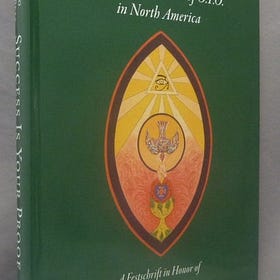
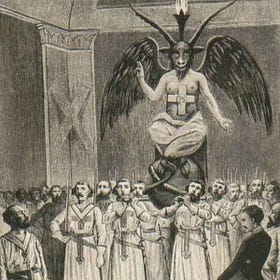
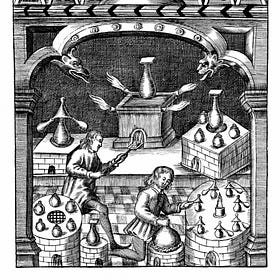

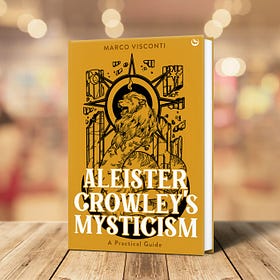
Well done, Marco. Your work reminded me of my youth. My generation or neighborhood, depending on how you look at it. Arguments were typically resolved through physical fights. Afterwards, we would buy each other a beer, often becoming lifelong friends as a result. It was the struggle and conflict itself that created those bonds. I just wanted to share this piece of nostalgia again and express how much I enjoyed reading it.
Thanks for another thought-provoking piece.
The most common interpretation of “As Brothers Fight Ye” is to view it as referring to fighting between ‘brothers’ but it can also be seen as an exhortation for ‘brothers’ to fight together against something or someone